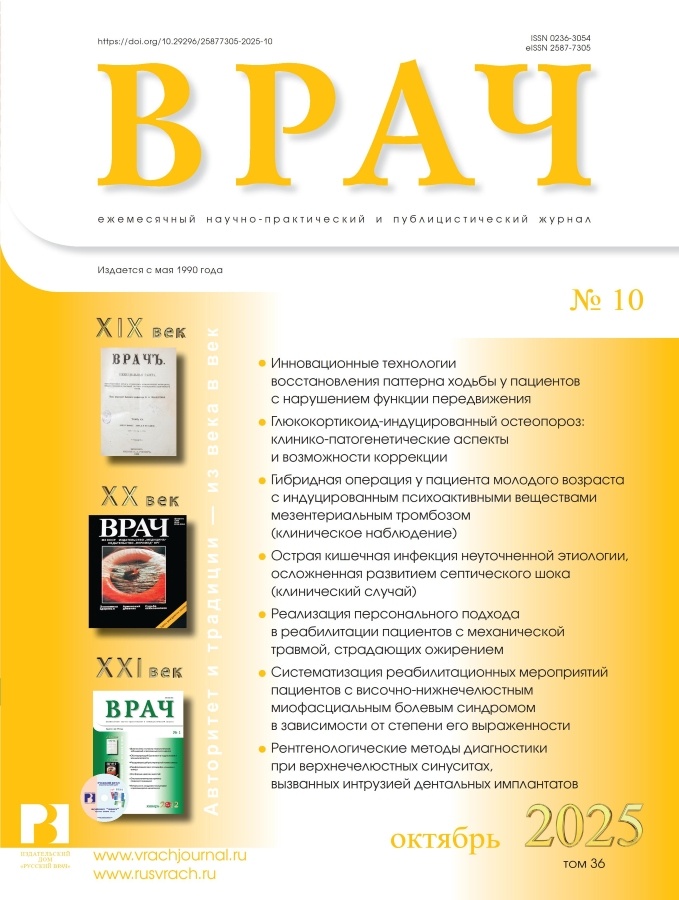Acute intestinal infection of uncertain etiology, complicated by the development of sepsis (clinical case)
- Authors: Igityan T.A.1,2, Burgasova O.A.1,3,2, Kulagina M.G.4, Tokmalaev А.K.1, Tetova V.B.1
-
Affiliations:
- Peoples' Friendship University of Russia named after Patrice Lumumba
- Infectious Diseases Clinical Hospital No.1 of the Moscow City Health Department
- N.F. Gamaleya National Research Center for Epidemiology and Microbiology, Ministry of Health of Russia
- Russian University of Medicine, Ministry of Health of Russia
- Issue: Vol 36, No 10 (2025)
- Pages: 46-49
- Section: From Practice
- URL: https://journals.eco-vector.com/0236-3054/article/view/696302
- DOI: https://doi.org/10.29296/25877305-2025-10-08
- ID: 696302
Cite item
Abstract
A clinical case of acute intestinal infection unspecified etiology complicated by the development of sepsis, multiple organ failure syndrome in a 29-year-old patient is presented. Despite a wide range of diagnostic and treatment options, the problem of acute intestinal infection remains relevant due to high morbidity and significant frequency of severe forms of infection. The gastrointestinal tract plays a central role in the pathogenesis of multiple organ dysfunction. Providing selective permeability, the intestinal barrier limits the systemic absorption of intraluminal microorganisms and it's toxins. Increased permeability of the intestinal barrier can cause generalization of the infectious and inflammatory process. Given the pathophysiology of acute intestinal infections and the development of septic complications, there is a need to use sensitive and non-invasive biomarkers of early disruption of the intestinal barrier in routine clinical practice for timely detection and treatment of patients with intestinal barrier dysfunction at risk of developing multiple organ dysfunction syndrome.
Full Text
About the authors
T. A. Igityan
Peoples' Friendship University of Russia named after Patrice Lumumba; Infectious Diseases Clinical Hospital No.1 of the Moscow City Health Department
Email: olgaburgasova@mail.ru
ORCID iD: 0009-0000-4257-3243
SPIN-code: 2608-5422
Russian Federation, Moscow; Moscow
O. A. Burgasova
Peoples' Friendship University of Russia named after Patrice Lumumba; N.F. Gamaleya National Research Center for Epidemiology and Microbiology, Ministry of Health of Russia; Infectious Diseases Clinical Hospital No.1 of the Moscow City Health Department
Author for correspondence.
Email: olgaburgasova@mail.ru
ORCID iD: 0000-0002-5486-0837
SPIN-code: 5103-0451
Professor, MD
Russian Federation, Moscow; Moscow; MoscowM. G. Kulagina
Russian University of Medicine, Ministry of Health of Russia
Email: olgaburgasova@mail.ru
ORCID iD: 0000-0003-2587-4911
SPIN-code: 1854-8601
Associate Professor, Candidate of Medical Sciences
Russian Federation, MoscowА. K. Tokmalaev
Peoples' Friendship University of Russia named after Patrice Lumumba
Email: olgaburgasova@mail.ru
ORCID iD: 0000-0001-7046-0799
SPIN-code: 1650-0831
Professor, MD
Russian Federation, MoscowV. B. Tetova
Peoples' Friendship University of Russia named after Patrice Lumumba
Email: olgaburgasova@mail.ru
ORCID iD: 0000-0002-4007-7622
SPIN-code: 3428-5987
Associate Professor, Candidate of Medical Sciences
Russian Federation, MoscowReferences
- О состоянии санитарно-эпидемиологического благополучия населения в Российской Федерации в 2023 году: Государственный доклад. М.: Федеральная служба по надзору в сфере защиты прав потребителей и благополучия человека, 2023 [On the state of sanitary and epidemiological well-being of the population in the Russian Federation in 2023: State Report. Moscow: Federal Service for Supervision of Consumer Rights Protection and Human Welfare, 2023 (in Russ.)].
- Lou X., Xue J., Shao R. et al. Postbiotics as potential new therapeutic agents for sepsis. Burns Trauma. 2023; 11: tkad022. doi: 10.1093/burnst/tkad022
- Abduganieva A.Y. Etiological factor of acute intestinal infections in different age groups. World Bulletin of Public Health. 2023; 29: 38–40.
- Lowenkron S.E., Waxner J., Khullar P et al. Clostridium difficile infection as a cause of severe sepsis. Intensive Care Med. 1996; 22 (9): 990–4. doi: 10.1007/BF02044130
- Assimakopoulos S.F., Triantos C., Thomopoulos K. et al. Gut-origin sepsis in the critically ill patient: pathophysiology and treatment. Infection. 2018; 46 (6): 751–60. doi: 10.1007/s15010-018-1178-5
- Serek P., Oleksy-Wawrzyniak M. The effect of bacterial infections, probiotics and zonulin on intestinal barrier integrity. Int J Mol Sci. 2021; 22 (21): 11359. doi: 10.3390/ijms222111359
- Piton G., Capellier G. Biomarkers of gut barrier failure in the ICU. Curr Opin Crit Care. 2016; 22 (2): 152–60. doi: 10.1097/MCC.0000000000000283
- Klaus D.A., Motal M.C., Burger-Klepp U. et al. Increased plasma zonulin in patients with sepsis. Biochem Med (Zagreb). 2013; 23 (1): 107–11. doi: 10.11613/bm.2013.013
- Sturgeon C., Fasano A. Zonulin, a regulator of epithelial and endothelial barrier functions, and its involvement in chronic inflammatory diseases. Tissue Barriers. 2016; 4 (4): e1251384. doi: 10.1080/21688370.2016.1251384
- Li Q., Wang C., Tang C. et al. Therapeutic modulation and reestablishment of the intestinal microbiota with fecal microbiota transplantation resolves sepsis and diarrhea in a patient. Am J Gastroenterol. 2014; 109 (11): 1832–4. doi: 10.1038/ajg.2014.299
- Fay K.T., Ford M.L., Coopersmith C.M. The intestinal microenvironment in sepsis. Biochim Biophys Acta Mol Basis Dis. 2017; 1863 (10 Pt B): 2574–83. doi: 10.1016/j.bbadis.2017.03.005
Supplementary files






